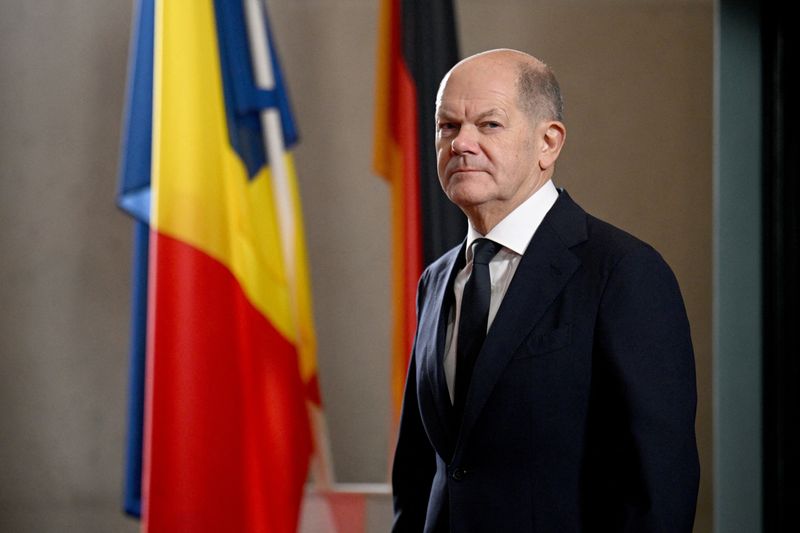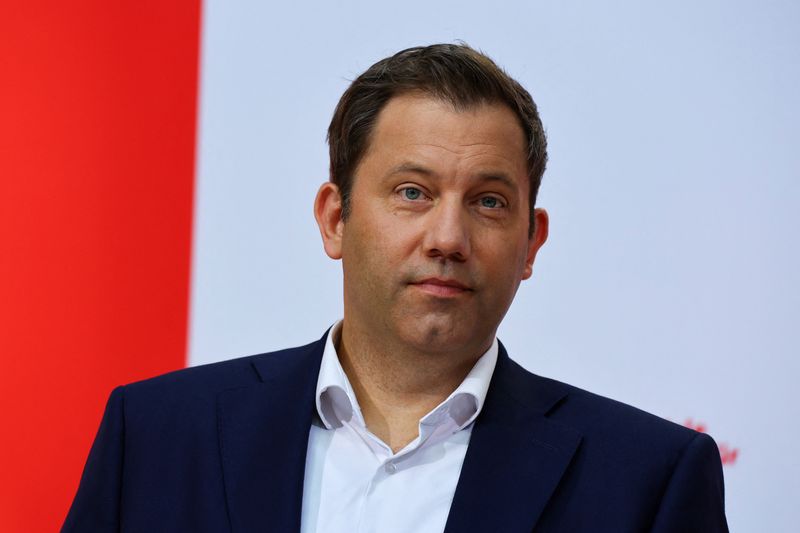By Maria Martinez
BERLIN (Reuters) -Changes are needed to Germany's spending cap to respond to the "financial emergency" of war in Ukraine, Chancellor Olaf Scholz said on Friday, after the centre-right opposition signaled willingness to reform the so-called 'debt brake'.
The leader of Scholz's Social Democrats (SPD) said remarks by the conservative opposition could provide a starting point to adjust the spending cap, which is enshrined in the constitution and can be altered only by a two-thirds majority of lawmakers.
German political parties have bristled over the spending rules, which they see as a hindrance at a time when war in Ukraine has held back growth in Europe's biggest economy and required extra spending on defence and support for Kyiv.
A dispute over spending led to the collapse of Germany's government last week, when Scholz fired Finance Minister Christian Lindner, ending a coalition between Scholz's SPD, Lindner's pro-market Free Democrats and the Greens.
"Russia's war is an extraordinary event that justifies a financial emergency - and therefore higher spending," Scholz said in an interview with the Sueddeutsche Zeitung newspaper published on Friday.
In last week's dispute, Scholz had wanted to suspend the debt brake citing special circumstances and Lindner refused, asking for cuts instead of new borrowing.
In Friday's interview, Scholz said "a modest reform" of the debt brake was required to meet NATO's target to spend 2% of GDP on defence, which would require increasing annual spending by nearly 30 billion euros by 2028.
"A reform will not solve all of our financial problems, but it will make our path a little easier," Scholz added.
Opposition leader Friedrich Merz of the conservative Christian Democrats (CDU) said earlier this week he could be open under certain circumstances to reforming the debt brake, which limits Germany's public deficit to 0.35% of gross domestic product.
The leader of Scholz's SPD, Lars Klingbeil, told the Handelsblatt newspaper on Friday that Merz's comments were "a good starting point for continuing straight away".
Klingbeil suggested the SPD could work with its conservative opponents to amend the debt brake rules before a snap election now set for Feb. 23 following the collapse of Scholz's coalition.
"Perhaps people will then look back on this moment and understand what an opportunity the democratic centre parties missed here," Klingbeil wrote on Friday on social platform X.
"First the country, then the party," he wrote, asking the conservatives for an agreement. "We would be ready."
Within the CDU, the debate about debt brake reform was reopened this year by Kai Wegner, the conservative mayor of Berlin. Several powerful CDU leaders from other regional governments have joined the push for reform because states are more constrained than the federal government, having no structural leeway to incur new debt.
The services sector trade union Verdi welcomed the new openness of Merz to reform the debt brake.

"This is an insight into what is necessary," Verdi's head Frank Werneke told Reuters. "We have a massive investment backlog in Germany, over 180 billion euros in the municipal sector alone."
If the next government continues to modernise the armed forces and maintains its support for Ukraine, this will require additional borrowing, he said.
